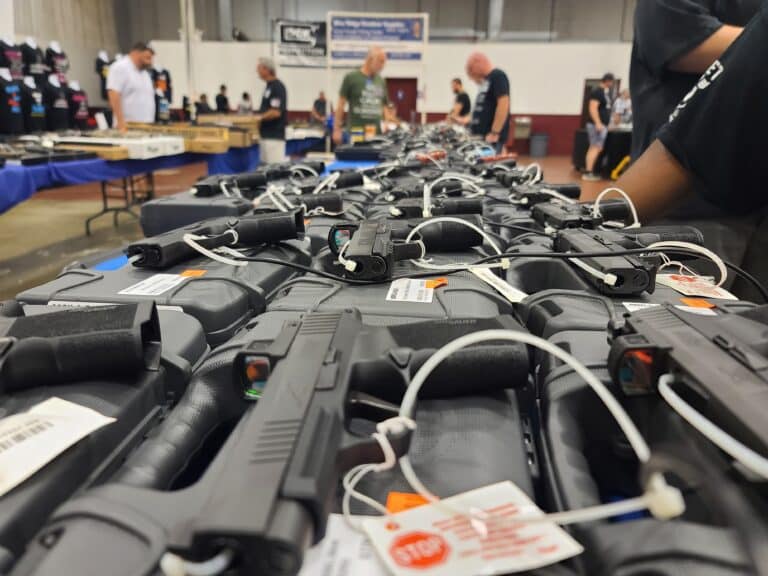Smoking pot occasionally doesn’t negate an American’s Second Amendment rights, a federal appeals court has ruled.
A three-judge panel for the Fifth Circuit Court of Appeals decided on Wednesday to toss the conviction of Patrick Daniels, a Mississippi man arrested and sentenced to prison for possessing firearms as an unlawful user of marijuana. The panel found that Daniels’ conviction was inconsistent with the “history and tradition” of gun regulation.
“In short, our history and tradition may support some limits on an intoxicated person’s right to carry a weapon, but it does not justify disarming a sober citizen based exclusively on his past drug usage,” Judge Jerry E. Smith, a Ronald Reagan appointee, wrote for the unanimous panel in US v. Daniels. “Nor do more generalized traditions of disarming dangerous persons support this restriction on nonviolent drug users. As applied to Daniels, then, § 922(g)(3) violates the Second Amendment.”
The panel’s decision marks the latest ruling to whittle away at the federal prohibition on gun ownership for unlawful drug users. It follows at least two other rulings from federal judges in Texas and Oklahoma who tossed similar charges on Second Amendment grounds. It adds to the growing list of cases in courts nationwide grappling with who the Second Amendment protects and when a person can be legally disarmed.
Daniels ran into legal trouble when two police officers pulled him over for driving without a license plate in April 2022. One of the officers, a member of the Drug Enforcement Administration, smelled marijuana in Daniels’ car and subsequently discovered multiple “marihuana cigarette butts” in the ashtray. He was also found to be in possession of two loaded firearms in the vehicle at the same time.
Though he was neither tested for nor accused of being actively high at the time of his arrest, he admitted to regularly smoking marijuana and was charged with violating the federal prohibition on gun possession by users of unlawful substances.
Daniels attempted to have his charges dismissed as unconstitutional under the Second Amendment but was denied by a Mississippi federal judge who suggested Daniels’ drug use rendered him outside of “The People” covered under the right to keep and bear arms. He was subsequently convicted and sentenced to four years in prison.
Upon appeal, the Fifth Circuit panel revisited whether drug use placed Daniels outside of the protection of the plain text of the Second Amendment. It concluded that the district court erred in its judgment.
“Even as a marihuana user, Daniels is a member of our political community,” Judge Smith wrote. “Therefore, he has a presumptive right to bear arms. By infringing on that right, § 922(g)(3) contradicts the plain text of the Second Amendment.”
The court then turned to the historical tradition of gun regulations to determine if there were analogous laws to the modern gun prohibition for drug users near the founding, as required for a gun restriction to be upheld under the test set by the Supreme Court in 2022’s New York State Rifle and Pistol Association v. Bruen.
The federal government argued that founding-era laws prohibiting men from showing up intoxicated to militia service and Reconstruction-era laws prohibiting gun carry while intoxicated fit the bill. The panel disagreed because such laws only governed being armed while actively under the influence rather than imposing a blanket ban on all substance users.
“Throughout American history, laws have regulated the combination of guns and intoxicating substances,” Judge Smith wrote. “But at no point in the 18th or 19th century did the government disarm individuals who used drugs or alcohol at one time from possessing guns at another. A few states banned carrying a weapon while actively under the influence, but those statutes did not emerge until well after the Civil War.”
Judge Stephen Higginson, a Barack Obama appointee, wrote separately to support the panel’s decision. But he also expressed his overall concerns with the Supreme Court’s Bruen test.
“Although our decision is limited in scope, it is hard for me to avoid the conclusion that most, if not all, applications of § 922(g)(3) will likewise be deficient,” Higginson wrote in a concurrence. “It is also important to acknowledge that other gun safety laws, especially longstanding status-based prohibitions previously understood to be constitutionally unassailable, have been recently struck down by courts across the country as they attempt to faithfully implement Bruen.”
He argued that courts all across the country are struggling to faithfully perform the required historical tradition analysis, often arriving at opposing conclusions on the same gun laws. He said many of the laws that have been struck down are critical for public safety.
“Myriad and obvious public safety laws, some over a century old, face inconsistent invalidation,” he wrote. “The impact of these challenges, outside of the evident yet indescribable tragedies of victims of gun violence, will fall heavily on states, which exercise most police power and must assure public safety.”
He suggested that the Supreme Court, when revisiting the Second Amendment this upcoming session, should place more weight on the middle clause of the amendment stating that the purpose of an armed citizenry is “necessary to the security of a free State.”
“I cannot help but fear that, absent some reconciliation of the Second Amendment’s several values, any further reductionism of Bruen will mean systematic, albeit inconsistent, judicial dismantling of the laws that have served to protect our country for generations,” he said. “Furthermore, such decisions will constrain the ability of our state and federal political branches to address gun violence across the country, which every day cuts short the lives of our citizens. This state of affairs will be nothing less than a Second Amendment caricature, a right turned inside out, against freedom and security in our State.”
Despite Higginson’s concerns, Judge Smith emphasized that the panel’s decision was limited in scope and did not call into question federal prohibition on gun possession by drug users as a whole.
“We do not invalidate the statute in all its applications, but, importantly, only as applied to Daniels. Nor do we suggest that a robust Second Amendment is incompatible with other reasonable gun regulations,” Smith wrote. “Such statutes just need to be consonant with the limits the Founding generation understood to be permissible when they ratified the Second Amendment. The government has failed to demonstrate that here.”
The Department of Justice did not respond to a request for comment.






